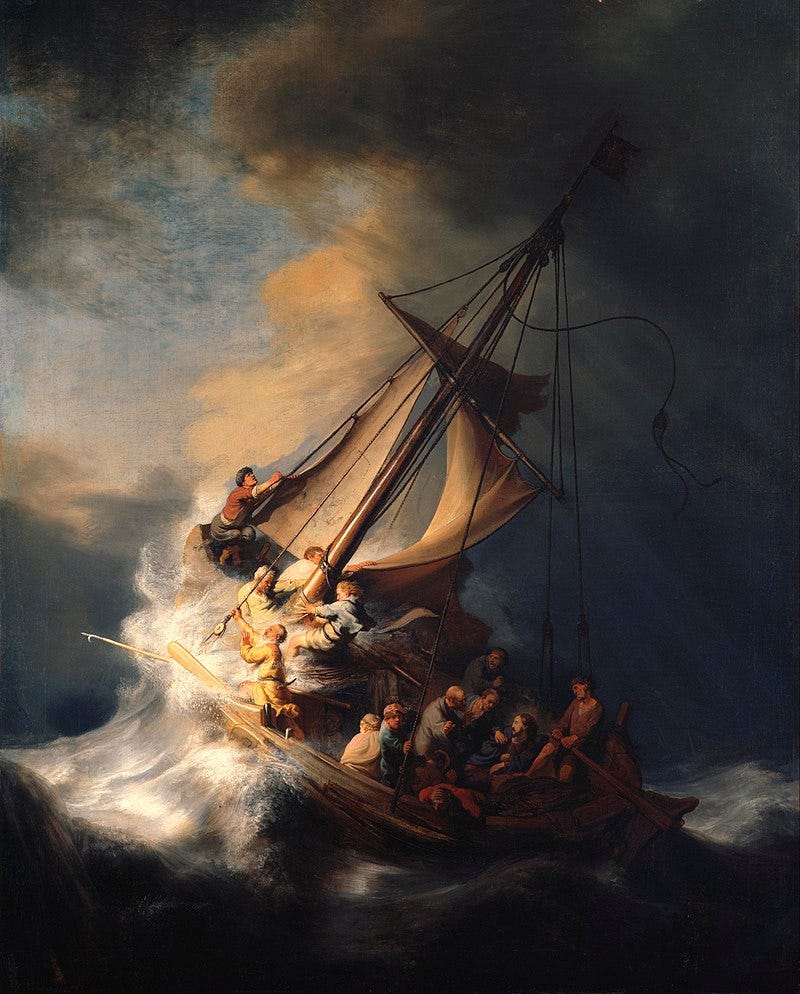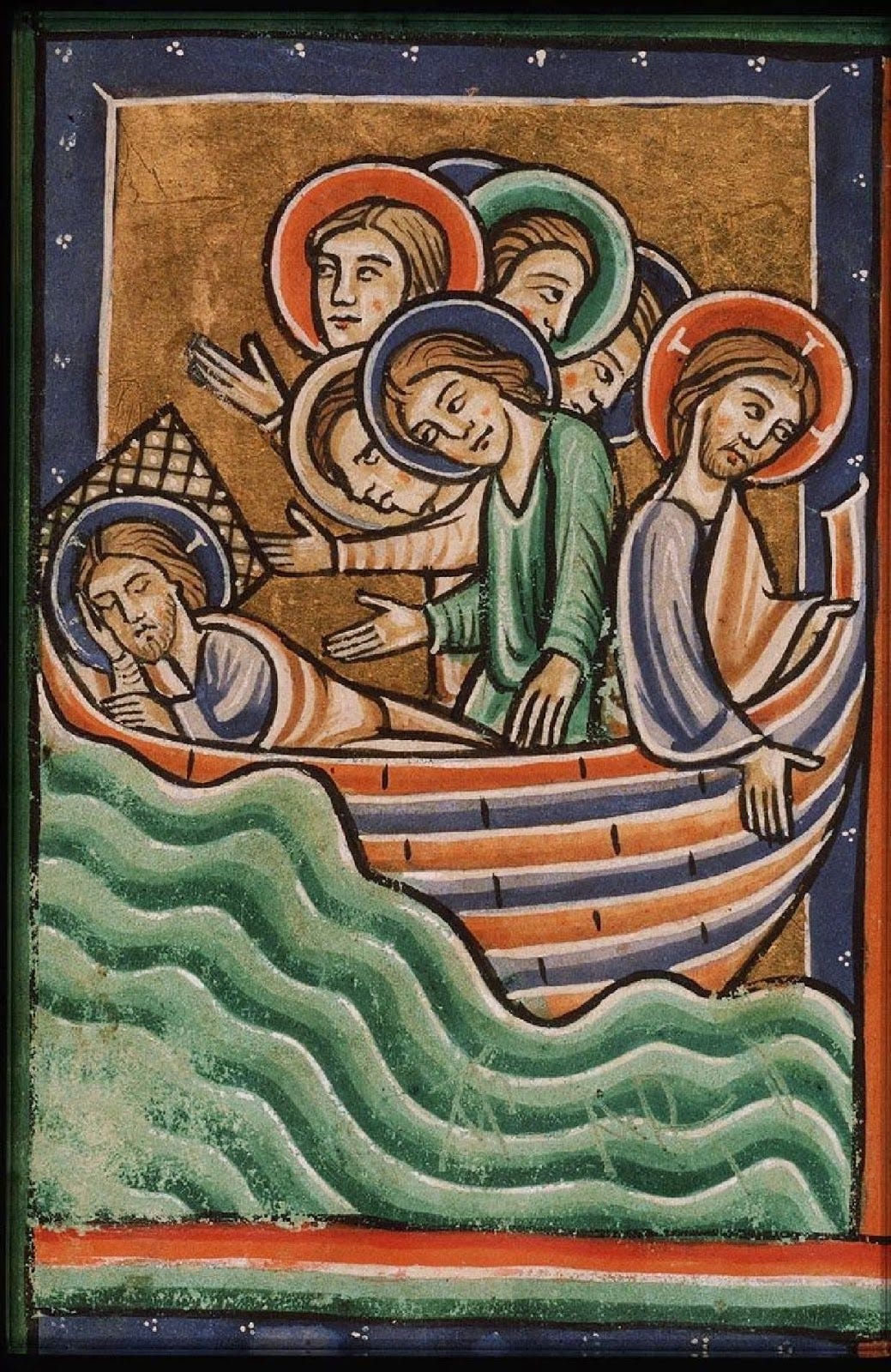Jesus is in a boat with his disciples. As it is with us when we find ourselves with Jesus, Jesus invited them men to board the boat. Jesus in a boat, out on the sea, with his buddies. To be out on the sea with Jesus is no docile journey. I am sure the journey started out as any previous fishing trip the disciples had been on. Calm seas. Sails going us the mast. The ropes are tied off. As the disciples worked their stations, Jesus took his place at the rear of the boat and laid down for an afternoon nap.
At first glance, we can read this text and see this as a biblical mandate for napping. I love a good nap. I have an epic nap planned for this afternoon, and I am sure many of you do as well. But as the waves became bigger and bigger, as the waves broke over the side of the boat, as the water filled the nooks and crannies of the boat quicker than the disciples’ buckets could move, the disciples began to panic.
The boat is threatened, and the disciples are in a full-blown panic. And where is Jesus? He’s still asleep. Jesus is curled up with a pillow at the back of the boat, sleeping like a baby. The disciples think they are about to sink as Jesus is peacefully asleep. The contrast could not be sharper.
They wake Jesus from his divine slumber and ask, “Do you not care that we are about to perish?”
“Jesus, the boat is sinking, and you are napping?! WTF, Jesus!”
“Do you not care that we are about to perish?”
It does not matter if you are young or old, there are no number of degrees, accolades, the title you hold or do not hold, moments of crisis will take hold in your life. If you are not currently in a moment of crisis, then you certainly know someone or a group of people facing a crisis.
The COVID-19 Pandemic was a global crisis that we all faced. The virus's effects touched every corner of the world, and no one was spared. The global crisis created new crises in our homes by exposing disparities within our community and forcing many to come to grips with the issues we ignored or, worse, attempted to hide under the cover of material possessions and the busyness of life.
Throughout the COVID-19 pandemic – through the Delta and Omicron variants, through a vaccine rollout and two boosters – I served as a hospital chaplain at Mary Washington Hospital. Through eight-hour day shifts and 16-hour night shifts, I stood beside patients, families, and hospital staff as they came face to face with a crisis of health. I learned early in my ministry at the Mary Washington that very few people request to see the chaplain when something good is happening. Instead, when the test results were not what was expected, when care was withdrawn, or when a patient or family member took their frustration out on a member of the medical team, the chaplain was called.
Whether in the pastor’s office, sanctuary, hospital room, or hospital chapel, the question most often asked was the same question the disciples asked of Jesus: “Does God not care?”
“My family is coming apart at the seams. Does God even care?”
“Pastor, I pray every day, rarely miss a Sunday worship service, and do my best to be a good person. So why is this happening? Does God care?”
“Chaplain, it feels like God has forgotten about… forgotten about our family. We’ve been barely hanging on, and now God goes and takes him from us?
The question the disciples urgently asked of Jesus, “Do you not care,” is our question.
It is easy to think that when you signed on to follow Jesus it would be smooth sailing. You might have thought that with Jesus in the boat (even if he is asleep in the back), there would be no storm, no waves over the bow, and nothing to fear. But here’s the thing. At nearly every turn in The Gospel of Mark, Jesus is at the center of a storm, at the center of a crisis. If you were ever told that following Jesus would lead to smooth sailing or save you from moments of crisis, I hate to be the bearer of bad news, but whenever Jesus is near, the wind will pick up, the waves will break over the bow of the boat, and there is trouble. Jesus did not shy away from trouble then, and he certainly does not now.
In Jesus calming the storm, the temptation is present to focus on Jesus calming the wind and waves. Cosmic power resides in Mary’s boy, who was present when the universe was a formless void. What a sight that must have been. Jesus, asleep at the back of the boat, wakes and springs into action. The disciples are saved.
Here’s the thing: Jesus was not concerned with the storm. It was not the wind and the waves that woke Jesus from his slumber. Jesus’s concern lies in the cry from his disciples, those he invited into the boat. Their cry is what wakes Jesus. It was the cry of the disciples that caused Jesus to calm the storm. Their cry, “Do you not care that we are about to perish?” is what compelled Jesus to act.
Jesus cares. Jesus not only cares but acts and saves.
You may have picked up on this – the story of Jesus calming the sea began with fear and the cry of the disciples, “Teacher, don’t you care if we perish?” But as the story begins in fear, the story ends in terror. Rev. Will Willimon wrote, “The calming of the wind and the waves anything but calmed those in the boat. They shook in terror, asking one another, ‘Who is this? Look! Even the wind and the waves obey him’”[i]
Robert Capon, the late Episcopal priest, wrote, “(Jesus) comes to us in the brokenness of our health, in the shipwreck of our family lives, in the loss of all possible peace of mind, even in the very thick of our sins. He saves us in our disasters, not from them. He emphatically does not promise to meet only the odd winner of the self-improvement lottery. He meets us all in our endless and inescapable losing.”[ii]
The story concludes with the disciples terrorized by Jesus’s intervention.
I find it reassuring to live in a world where not only does God care but God acts.
Our God has the means to deal with tragedy, crisis, and anything else that gives us cause to fear. Because the calming of the storms of our lives is not left entirely up to us, there is hope. There is always hope, always a way when a way does not seem possible. The story begins with Jesus rebuking the wind and ends with the rebuking of the disciples. “Why are you afraid? Have you no faith?”
The disciples are still learning who Jesus is, just as we, through a life of faith, are learning who Christ is, day in and day out. It is not that God changes, but instead that the saving grace of God is revealed anew to us as God’s grace continues to transform us, not so that we will come before God filled with fear but so that we can live into the fullness of life in Christ.
[i] Wiilimon, Will. “Does Jesus Care?” Preached at Duke Divinity Chapel. 6/22/1997
[ii] Capon, Robert. The Third Peacock.



















Share this post